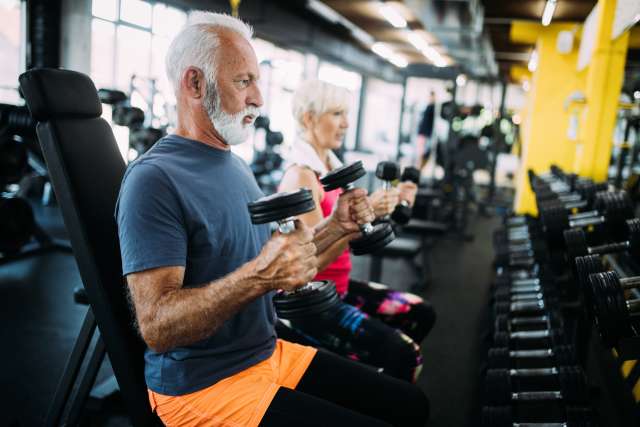Dear Doctors: My grandmother is 81 years old and still active. She comes to yoga classes at my gym, and we have a lot of fun. Now she wants to try weightlifting, but my parents are saying it’s not a good idea. Would it be dangerous for her? Couldn’t it maybe be a good thing?
Dear Reader: When talking up the many benefits of beginning a regular program of resistance training and lifting weights, we tend to picture the advice applying to people within a certain age range. Chances are, it doesn’t include adults in their 80s, like your grandmother. The perception of that population is they are too frail to take on something as arduous as weight training, and that due to age-related changes to their muscles, rewards would be minimal.
Now, with one significant tweak to previous research protocols, a group of scientists in the Netherlands have called those views into question. They eliminated an age cap that had excluded people in their 80s and 90s from this type of research. In doing so, they found that many older adults were able to make significant gains in strength and muscle mass. Even more surprising, the participants in the study were all new to resistance training.
Resistance training is just as it sounds: adding some type of physical impediment to movement. The addition of that resistance means the targeted skeletal muscles have to work harder to complete the movement. It can be in the form of handheld weights, free weights or barbells, exercise machines, elastic resistance bands or isometric exercises. Resistance training has been shown to increase strength, improve balance, boost mobility, help maintain skeletal strength and aid in weight control. It has also been found to improve mood, help preserve cognition and lead to improved sleep.
This new study looked at 29 women and men, each living independently and without serious health problems. They were sorted by age into two groups: The younger group included 17 participants between 66 and 70 years old; the older group ranged from 84 to 90 years old. The volunteers received individual instruction on weight machines and exercised three times per week. Over the course of the study, some worked up to using weights set at 80% of their maximum muscle strength. At the end of 12 weeks, the researchers were startled to find that while both groups showed significant improvement in both muscle mass and muscle strength, gains made by the group of older volunteers outpaced the younger ones.
When it comes to adding any type of exercise to your daily life, it’s a good idea to check in with your health care provider. This is especially true for older adults. Exercise places additional burdens on the heart and lungs and can affect a number of metabolic processes. Working with weights is not just about strength, but also about proper alignment, pacing and recovery. If your grandmother gets the green light to move forward, it’s very important that she does so with an experienced trainer.
(Send your questions to askthedoctors@mednet.ucla.edu, or write: Ask the Doctors, c/o UCLA Health Sciences Media Relations, 10960 Wilshire Blvd., Suite 1955, Los Angeles, CA, 90024. Owing to the volume of mail, personal replies cannot be provided.)




